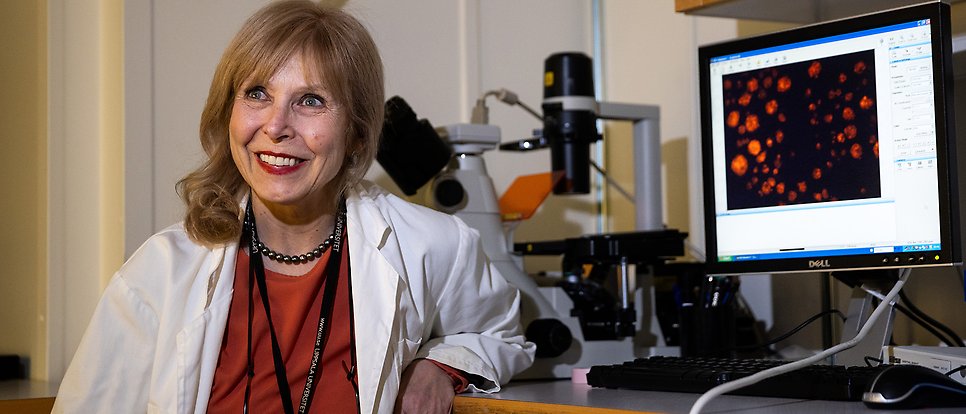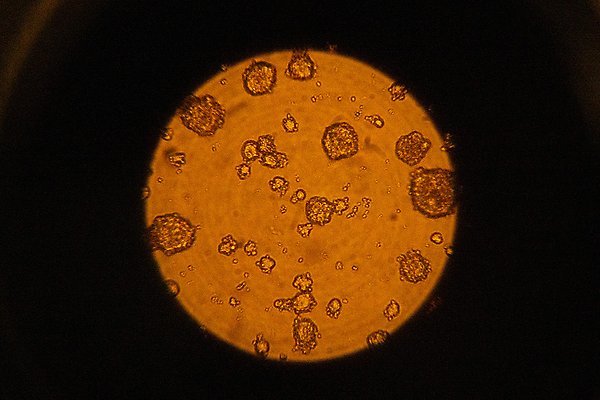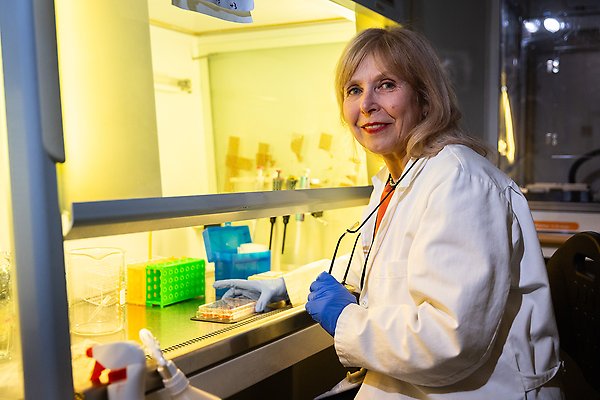Stem cells sent into space

"We hope the experiment will help us learn more about how stem cells are affected by microgravity, both in the short and long term", says Elena Kozlova. Photo: Tobias Sterner
How are stem cells affected by being in space? This question is the focus of Professor Elena Kozlova's research team at Uppsala University. They will soon have a unique opportunity to test this in practice, during a two-week spaceflight.
Swedish astronaut Marcus Wandt will soon embark on a space journey to the International Space Station (ISS). There, he and the rest of the crew will take part in around 30 different scientific experiments, two of which come from Sweden and are financed by the Swedish National Space Agency.
One of the projects involves stem cells and is led by Elena Kozlova, Professor of Regenerative Neurobiology at Uppsala. On 2 January, members of the research team will travel to the Cape Canaveral Kennedy Space Station. They have been working since last summer to prepare the experiment, says Kozlova.
“We have to produce a huge amount of cells in the lab. About 50 million cells will be travelling on the spaceflight and the same number of cells in control groups.”
Exposed to microgravity
Researchers have previously sent stem cells into space with sounding rockets where they were exposed to a few minutes of microgravity. The stem cells were found to have a greater capacity to divide and develop into mature cells than they have under normal conditions on Earth. Now they will be in space for a full two weeks.
“We hope the experiment will help us learn more about how stem cells are affected by microgravity, both in the short and long term. Our research aims to understand how the impact of microgravity on stem cells can contribute to their use for medical purposes,” continues Kozlova.

The stem cells the researchers cultivated had strong positive effects on the other cells in the tissue. Photo: Tobias Sterner
She became interested in stem cells through her research on nerve cell transplants following spinal cord injuries. She discovered that the stem cells they cultivated had strong positive effects on the other cells in the tissue. Blood vessel growth and cell survival improved, for example.
“We are interested in what makes these cells so robust and tolerant of physical forces, compared to other cells. Another interesting question is how we can produce different types of cells from stem cells. We really know very little about how physical factors can influence stem cells to become a certain type of cell.”
Keeping stem cells alive
The big challenge will be to keep the stem cells alive, not only during the two weeks in space, but also during pre-launch preparations and with a margin for delays.
“We’ve tested them for three weeks previously, and they survived for three weeks in our anaerobic conditions on the table. But it was not in the real environment, so the biggest challenge for us is of course to bring them back alive,” explains Kozlova.

Elena Kozlova, Professor of Regenerative Neurobiology at Uppsala University. Photo: Tobias Sterner
Hopefully, the stem cells will survive and thus enable the research team to undertake a long series of experiments.
“We’re planning quite a few experiments. And we will start immediately because we want to understand if microgravity has an immediate effect, or if it can only be detected later.”
Annica Hulth
International space experiment
- Marcus Wandt is a project astronaut with the European Space Agency (ESA).
- During his two weeks on the International Space Station, he will conduct an experiment on stem cells for Uppsala University and one on ergonomics for KTH. Both projects have been selected and funded by the Swedish National Space Agency. In total, the ESA has scheduled 82 hours of experimental work during its stay on the Space Station.
- The trip is being organised by Axiom Space (Ax-3) in partnership with NASA and SpaceX. In addition to Marcus, the crew consists of mission specialist and commander Michael López-Alegría, pilot and Colonel in the Italian Air Force Walter Villadei and mission specialist Alper Gezeravci from Turkey.
